The Proverbs of Hell 39/39: The Wrath of the Lamb
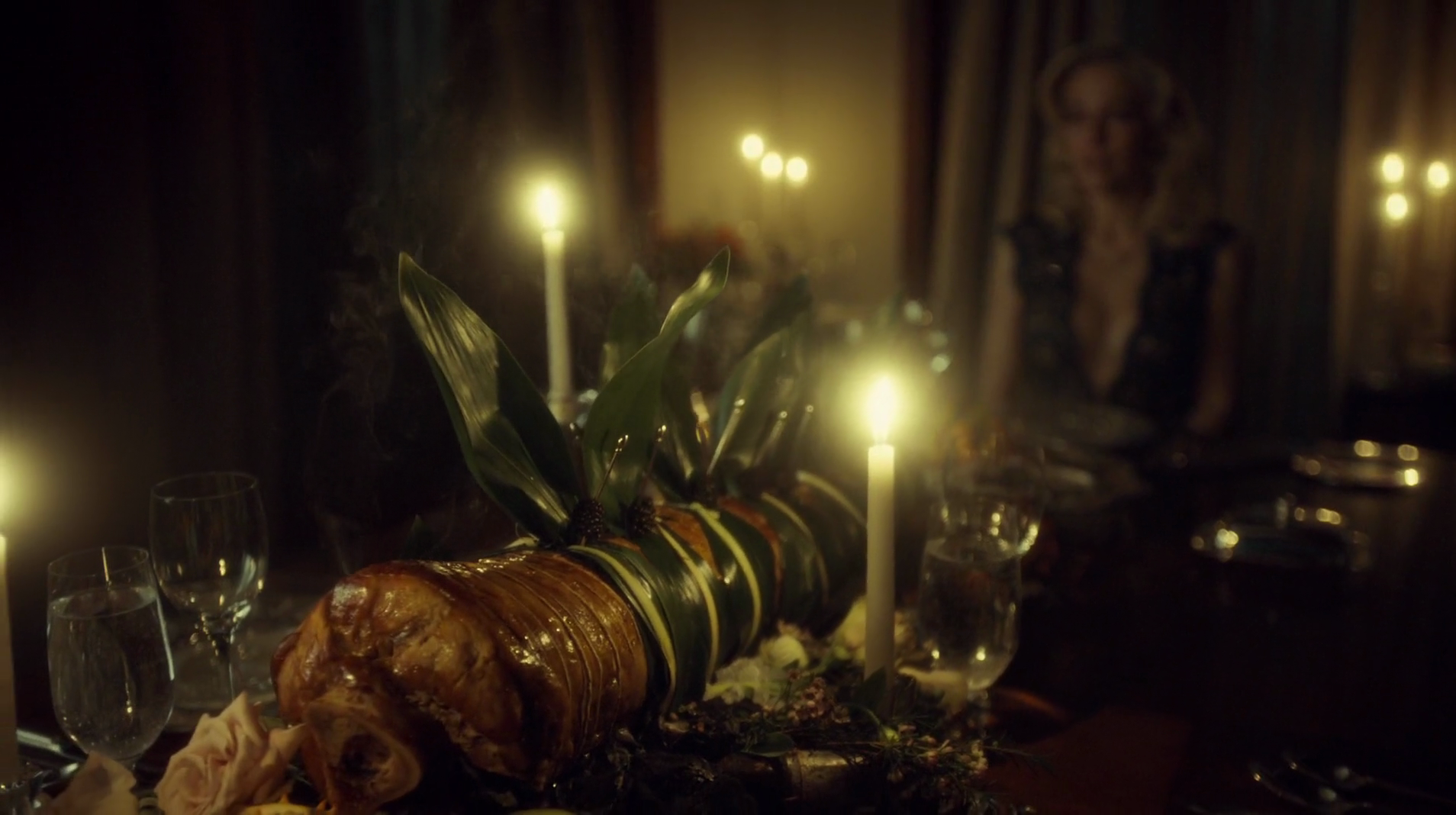 THE WRATH OF THE LAMB: Reframing the title scheme for the back half of the season away from “Blake paintings” and towards “lines from Revelation,” and not entirely honestly. The title drop in the proceeding episode forces single vision, such that it can only refer to Will’s vengeance against Hannibal, although it’s not as though it would have been long on ambiguity without that.
THE WRATH OF THE LAMB: Reframing the title scheme for the back half of the season away from “Blake paintings” and towards “lines from Revelation,” and not entirely honestly. The title drop in the proceeding episode forces single vision, such that it can only refer to Will’s vengeance against Hannibal, although it’s not as though it would have been long on ambiguity without that.
I complained on Twitter a while back that there are no good instances of the deceptive edit, in which information is withheld from the audience purely by selectively editing around it so as to obscure it. The general problem with this is that it depends on selectively and covertly breaking the basic narrative codes of the medium, which state that editing is for communicating information, not for casual lying without any hints to this effect. Hannibal likely comes closer than most to being able to get away with it by the simple virtue of its editing never really suggesting a directly communicated reality in the first place. But the real reason it just about gets away with having an unseen cadaver in the room for this entire scene is just that the deception is mercifully short-lived.
It’s also worth noting that fully six minutes of this episode are pulled forward from “The Number of the Beast is 666.” To my knowledge the full details of the production of “The Wrath of the Lamb” have not yet been shared, but it’s evident that it was a troubled production, a fact that particularly affects the final fight scene, and the amount that had to get moved into it to get it up to its length seems to speak to that.
REBA MCCLANE: I drew a freak.
WILL GRAHAM: You didn’t draw a freak. You drew a man with a freak on his back. Nothing wrong with you, don’t let yourself believe there is.
REBA MCCLANE: I know there’s nothing wrong with me. In making friends, I try to be wary of people who foster dependency and feed on it. I’ve been with a few. The blind attract them.
WILL GRAHAM: Not just the blind.
It’s probably not the show’s deftest handling of blindness to use it as a basis for equating Reba and Will, but equally, the moment of shared empathy is important, especially as it’s the one opportunity to interact with someone other than Dolarhyde that Reba gets. The more interesting line, however, is Will’s defense of Dolarhyde, which grants the reality of his split personality in a way that leaves Dolarhyde himself oddly blameless.
WILL GRAHAM: Molly and I want it to be the same.
HANNIBAL: When life becomes maddeningly polite, think about me. Think about me, Will, don’t worry about me.
There’s a cut to Hannibal’s line, which is scripted to begin “Mutual assurances you try to exchange in the dark and in the day will pass through some refraction, making them miss their mark.” One assumes it’s for pacing reasons so as to get to the punchline faster, and in turn set up Will’s retaliation, but its a pity, as it’s a good line. Still, in this form Hannibal’s remark cuts far more efficiently to the meat of the matter, which is that Will simply isn’t capable of extended happiness in the world of the maddeningly polite.
WILL GRAHAM: You turned yourself in so I would always know where you are. You’d only do that if I rejected you. Good-bye, Hannibal.
HANNIBAL: Will… Was it good to see me?
WILL GRAHAM: Good? No.
By some margin Will’s best attack on Hannibal—the one time he fully and truly throws him off his game, forcing the feeble and failed response. Fuller has suggested complete sincerity on Will’s part in interviews, which is justifiable, but I find I prefer a level of ambiguity here as to whether this was actually Will’s conscious intention in “Dolce” or whether he’s just seized upon it as a retort to Hannibal in the moment. The pause, as though he’s disclosing something he’d previously thought better of, certainly does point towards the former, but it is in some ways the wrong sort of cunning for Will.
FRANCIS DOLARHYDE: Your face is closed to me.
WILL GRAHAM: If I can see you, you can see me.
FRANCIS DOLARHYDE: You think you understand, don’t you?
WILL GRAHAM: ”I understand that blood and breath are only elements undergoing change to fuel your Radiance.” Hannibal said those words. To me.
FRANCIS DOLARHYDE: I tried to share with Lecter, and Lecter betrayed me.
Will pulls a fascinating metatextual move here, recognizing that Hannibal’s words from “Kō No Mono” are in some sense a description of Dolarhyde, which, of course, they in practice are, and using this fact to expose the sorts of games that Hannibal likes to play so as to reveal to Dolarhyde the extent to which he has been manipulated and turn him against Hannibal. It’s an impressively fast calculation made entirely in response to information Will didn’t have mere moments before—in other words, the sort of thing Hannibal routinely does.
WILL GRAHAM: The obvious thing is to try to get him to come to us. Bait him with something he wants more than me.
JACK CRAWFORD: He’d be an idiot to go for it.
WILL GRAHAM: I know. Want to hear what the best bait would be?
JACK CRAWFORD: I’m not sure I do.
WILL GRAHAM: Hannibal would be the best bait.
Is Will even trying to fool Jack here? The previous scene has him pretending to just learn that Dolarhyde is alive, but the way he’s presenting this plan to Jack is so openly cynical that it’s hard to think the deception is particularly important to him. Will’s approach is, of course, fatalistic, and he’s surely mindful of this, but in some ways his cavalier approach to Jack here is the clearest marker of how bad a state he’s actually in at this point.
WILL GRAHAM: I guess this is my Becoming.
BEDELIA DU MAURIER: What you’re “becoming” is pathological.
WILL GRAHAM: Extreme acts of cruelty require a high degree of empathy.
BEDELIA DU MAURIER: You found religion. Nothing more dangerous than that.
WILL GRAHAM I’d pack my bags if I were you, Bedelia. Meat’s back on the menu.
BEDELIA DU MAURIER: You righteous, reckless, twitchy little man. Might as well cut all our throats and be done with it.
WILL GRAHAM: Ready or not. Here he comes.
The surprise of Bedelia’s outright explosion of rage here masks the further establishment of Will’s cavalier-to-suicidal inclinations. By this point we’ve been primed to mistrust Bedelia such that her fury at the fact that Will is risking Hannibal’s escape does not entirely register, and we instead enjoy Will’s petty digs without adequate reflection on the matter at hand.
DR. CHILTON: Dithers if I had them, I would burn the man alive… though maybe I would rather have his skin. I’ve been getting grafts. Oh, how I would love to count Hannibal among my donors.
And so it’s established how Chilton would have survived into Season Four to get some fresh mutilation.
HANNIBAL: Any rational society would either kill me or give me my books.
A rare outbreak of Hannibal’s fedora side, although one wonders what on Earth Hannibal’s argument for anything other than the first option would be.
HANNIBAL: You didn’t just say good-bye, though, did you? That little extra bit at the end. What was that you said?
WILL GRAHAM: You wouldn’t have turned yourself in unless I rejected you.
HANNIBAL: Yes. That extra bit. I believe that’s what they call a “mic drop.” You dropped the mic, Will, but here you are having to come back and pick it up again.
It is possible that after thirty-nine episodes of Hannibal, the idea of Hannibal Lecter using the term “mic drop” is the show’s most deliciously perverse conceit.
WILL GRAHAM: What are you doing?
HANNIBAL: You know, Will, you worry too much. You’d be so much more comfortable if you relaxed with yourself.
Hannibal’s sense of what Will’s most urgent therapeutic needs are has shifted substantially.
HANNIBAL: The bluff is eroding. There was more land when I was here with Abigail. More land still when I was here with Miriam Lass.
WILL GRAHAM: Now you’re here with me.
HANNIBAL: And the bluff is still eroding. You and I are suspended over the roiling Atlantic. Soon all of this will be lost to the sea.
In practice this dialogue is necessary to remind viewers of the nature of this house and thus set up the final shot. That said, when Luther did more or less the same riff at the start of Series 4 it was rightly mocked for being on the nose and stupidly precious.
HANNIBAL: My compassion for you is inconvenient, Will.
WILL GRAHAM: If you’re partial to beef products, it’s inconvenient to be compassionate toward a cow.
The script calls for Hannibal to consider killing Will with the corkscrew he’s holding before making this comment, a gesture that does not come through in the directed version, but provides some context at least. The response is not what you’d call Will’s finest quip. For one thing, it’s flatly wrong, the obvious counterexample being farmers. An even moderately decent farmer is compassionate toward the livestock they tend, seeking to give it a blissful and untroubled life that is in many ways the very definition of “idyllic.” They also will take pride in their craft and enjoy the food that they have reared when it comes time for slaughter. This is not so much an inconvenience as a basic axiom of how this process works. More to the point, it misunderstands his relationship with Hannibal. Hannibal does not have compassion for everyone he kills, but he clearly does for the special occasions. Miriam Lass, Abigail Hobbs, his anticipated murders of Bedelia and Alana, and even people like Abel Gideon and Beverly Katz are all people he felt a measure of compassion for, in the “extreme acts of cruelty require a high degree of empathy” sense of the concept. His compassion for Will is an entirely different beast.
FRANCIS DOLARHYDE: I’m going to film your death, Dr. Lecter, as dying, you meld with the strength of the Dragon.
HANNIBAL: It’s a glorious and rather discomfiting idea.
Hannibal is admirably consistent in his reaction to the idea of being art-murdered.
The big fight, which was apparently an absolute nightmare to film as, Horns of Nimon style, the money ran out while they were shooting it and they were basically left without sufficient coverage. Thankfully instead of being stuck with a take where Richard Armitage cracks up while dying they manage to salvage it with some re-editing of the episode to get the missing close-ups of Dolarhyde from a fantasy sequence meant to have gone in amidst the house fire stuff at the beginning, using the footage they had in slow motion, and the fact that Brian Reitzell got Siouxsie Sioux to write an original song for them.
SIOUXSIE SIOUX: Oh, the skies, tumbling from your eyes
So sublime, the chase to end all time
Seasons call and fall, from grace and uniform
Anatomical and metaphysical
The song is not exactly her best effort, but sexy and murderous are definitely beats Sioux can hit without rancor, and the effect is haunting and disturbing enough to carry the show over the line. The best part is probably the last line, which sounds suitably haunting while, in the contrast between the two words, providing a pretty dead-on account of the poles of Hannibal’s aesthetic investment.
WILL GRAHAM: It really does look black in the moonlight.
HANNIBAL: See. This is all I ever wanted for you, Will. For both of us.
WILL GRAHAM: It’s beautiful.
Hannibal is, I think, essentially honest and accurate here. This is the heart of what he wanted out of his friendship with Will, in all its monstrosity and generosity.
The temptation is to tie off the long-running thread of Fuller/Moffat influence here, but obviously this is just a common source, with Fuller opting for a tried and true way of mothballing a franchise for a bit. Inasmuch as it’s interesting, the interesting detail is that the main character being mothballed is the villain, who in Doyle’s original was in practice a disposable figure he’d make no serious subsequent use of, but is here the absolute heart of the matter.
The post-credit tease, left in place as a particularly and beautifully agonizing gesture towards unfinality, is mostly puzzling. The major question comes down to time—when does this scene take place in relation to Dolarhyde’s death? If this is more or less simultaneous then the nature of what’s happened to Bedelia is immensely confounding, as it doesn’t seem like it can be Hannibal’s doing. A time lag is both more likely and less interesting.

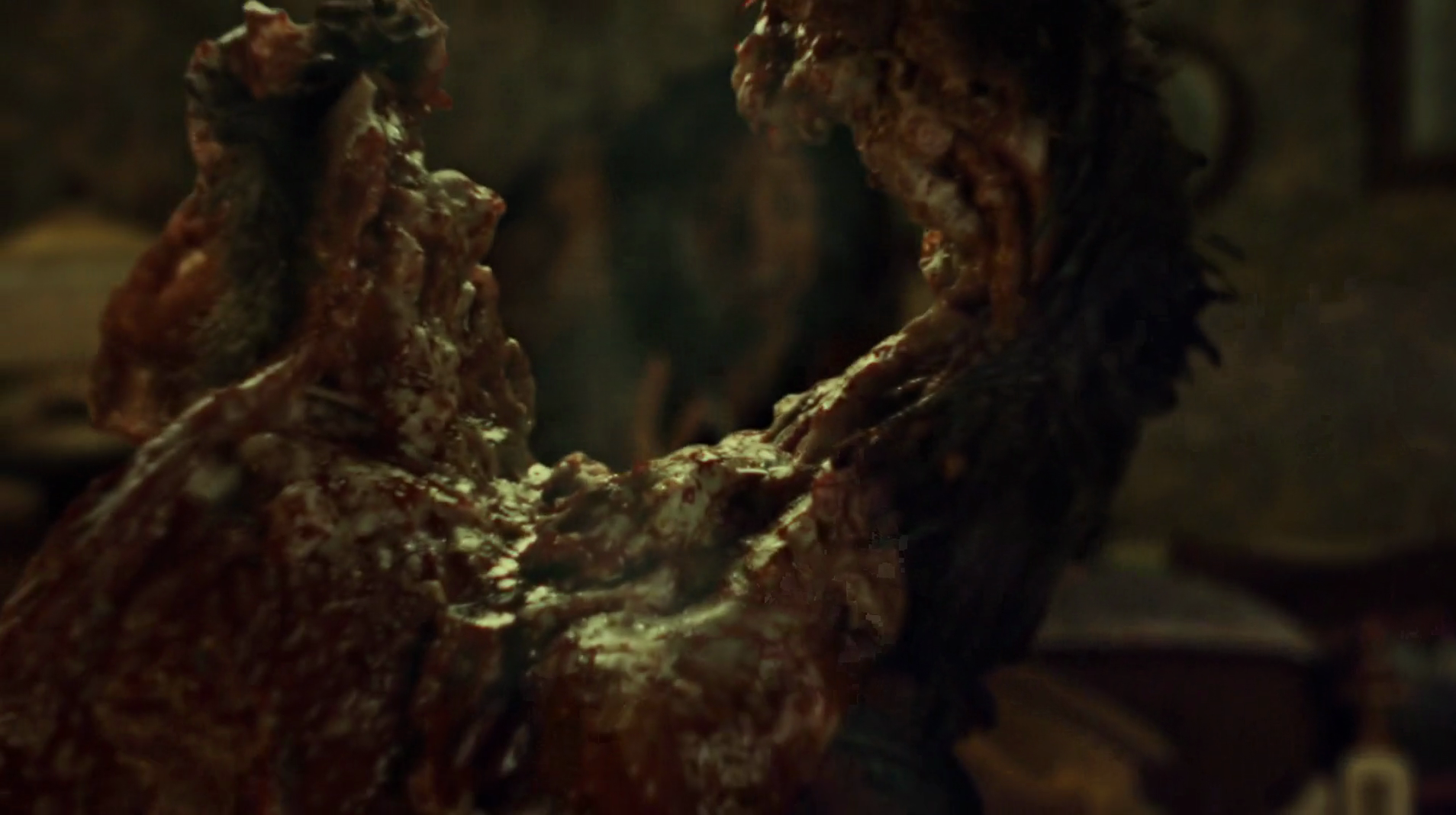
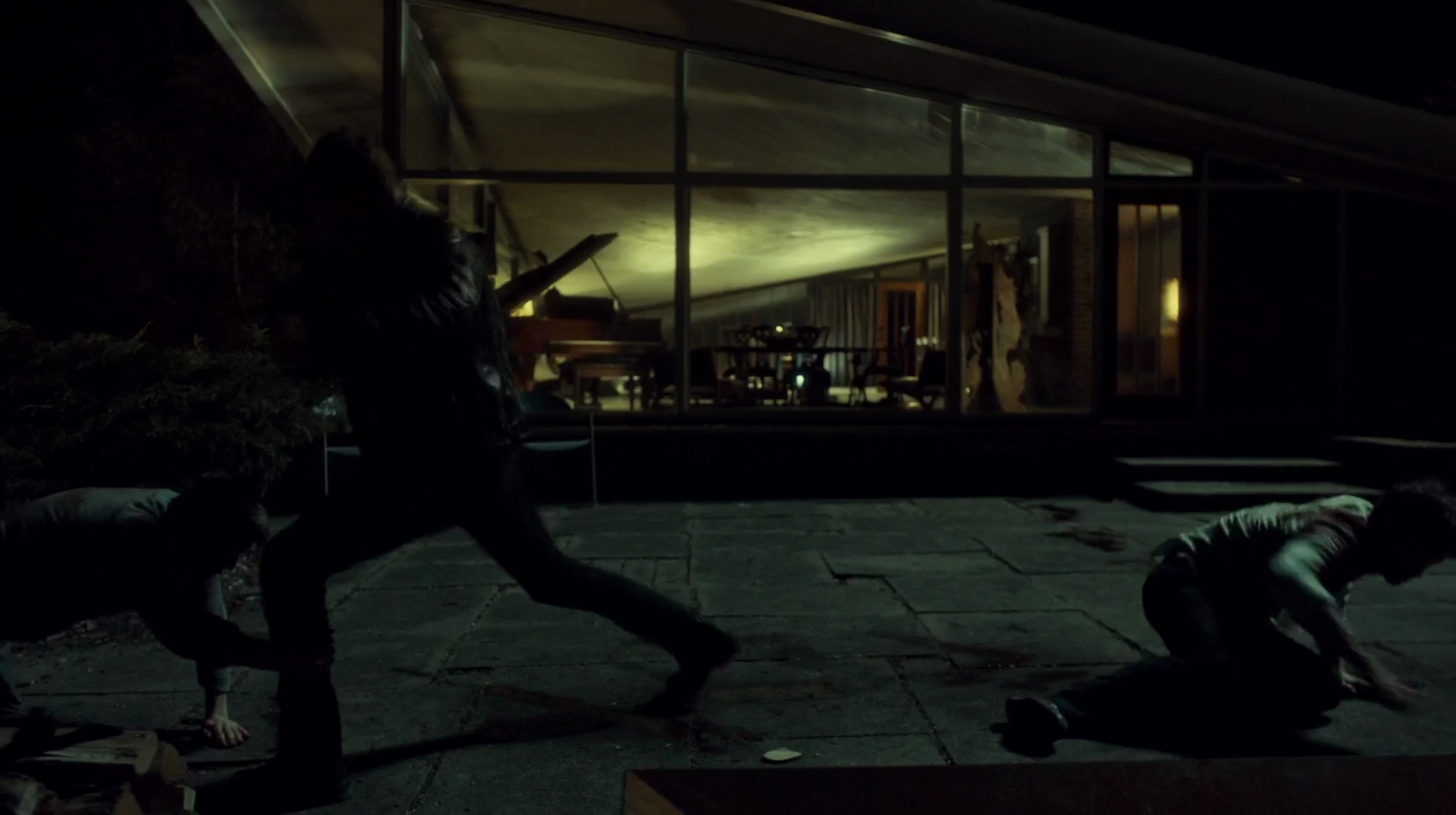
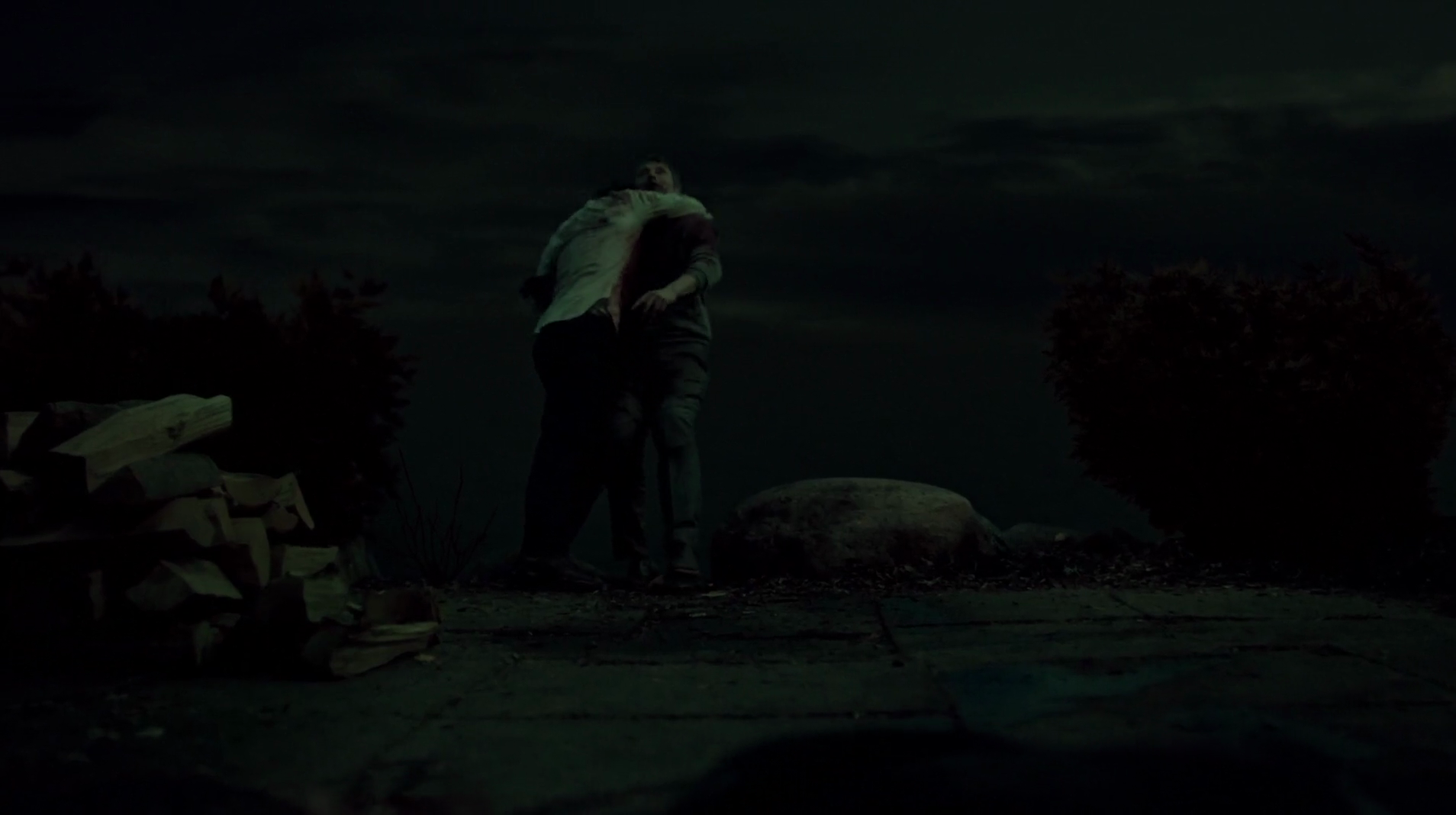
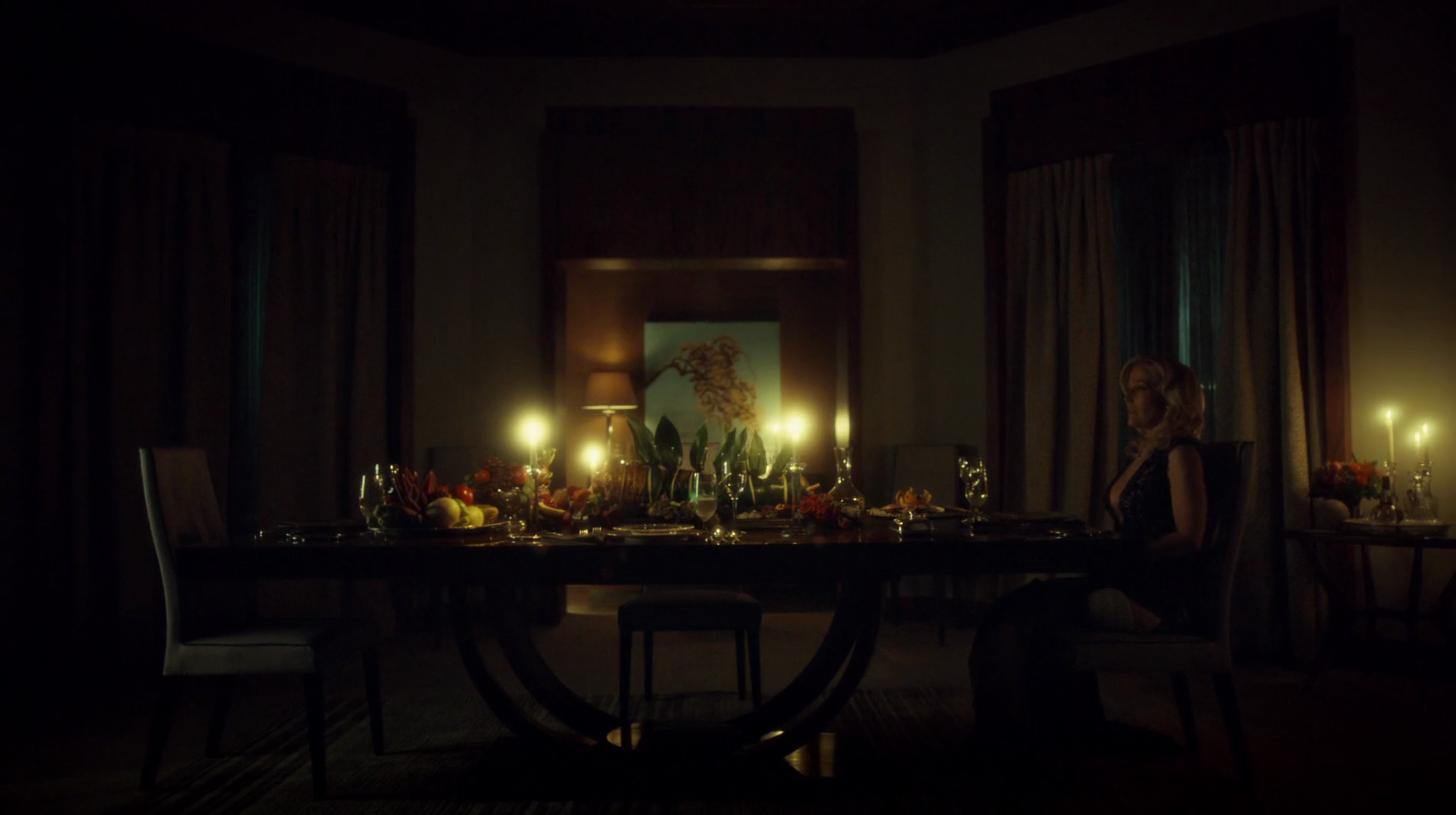
March 8, 2018 @ 6:11 pm
“Will simply isn’t capable of extended happiness in the world of the maddeningly polite”
This is a question that, to me at least, is not definitively answered within the series. Partly because we see very little of his life with Molly for instance. His ventures into the world of cannibalistic ubermensch and artisanal murderers definitely do not make him happy – it seems that every time they’re a compulsion, or maybe an obligation. Is scratching a scab until it bleeds happiness?
The phrase “maddeningly polite” is interesting, as it’s usually the rude that Hannibal looks down on.
“I find I prefer a level of ambiguity here as to whether this was actually Will’s conscious intention in “Dolce” or whether he’s just seized upon it as a retort to Hannibal in the moment”
My impression when I was watching the series was that this is an improvised jab, and that in Dolce Will was simply done with Hannibal and didn’t care about him anymore. But maybe I was projecting onto Will something that I wished was true.
“An even moderately decent farmer is compassionate toward the livestock they tend, seeking to give it a blissful and untroubled life that is in many ways the very definition of “idyllic””
To quote the spectre occasionally haunting this series, “No one loves cattle more than Burger King”.
And speaking of Moffat, it’s worth noting that in 2015 he and Fuller seemed to simultaneously arrive at the idea of female characters finding their own female companions and getting out of the narrative.
“A time lag is both more likely and less interesting”
For me, as someone who wished desperately that Will would leave Hannibal, or, worst case scenario, died bringing him down, the implications of that last scene essentially broke the series. Although I suppose as long as there is the prospect of season 4, there is hope.
March 9, 2018 @ 12:29 pm
I agree with mx_mond about Will’s happiness. He never seemed particularly happy in the nightmarish world of Hannibal. To be fair, he didn’t really seem that happy with Molly either but I still read Hannibal’s “maddeningly polite” line as him projecting what he wishes was true onto Will. I think Will was the happiest alone, with his dogs and his fishing. Just like he was at the beginning.
Hannibal’s view of Will always seemed skewed to me. It reminded me of how a toxic, possesive person might see their partner: as an extension of their own pathologies. Someone just as broken as themselves, with whom the toxic person can bond and blend together in a “us against the world” fashion. Hannibal tends to take other people’s natural capacity for cruelty and self-destruction, foster it carefully through manipulation and then act as if he enabled them to become their true selves. Thank God Will saw through that eventually.
March 8, 2018 @ 8:55 pm
” the nature of what’s happened to Bedelia is immensely confounding”
I took this to be an offering: Bedelia amputating and preparing her own leg to Hannibal’s standards in advance of his arrival, hoping to be eaten but yet live. As plans for engaging with Hannibal go, it at least has the advantage of audacity.
March 8, 2018 @ 11:06 pm
I tend to agree with this reading, which makes even stranger (if I am remembering the scene correctly) that the table is set for three.
March 9, 2018 @ 7:05 pm
I assumed she was expecting Will to be joining them.
March 9, 2018 @ 12:02 pm
Yeah, I think I remember getting that impression as well.
March 9, 2018 @ 2:03 pm
I’m going to miss this series. Both the actual series and these pieces of analysis. They remind me of those videos where you watch someone eating a meal silently. It’s obviously something you enjoyed immensely and felt no obligation to make to anyone else’s taste except your own.
Well done, Phil. Hope the whatever’s next is just as strange and satisfying.
March 13, 2018 @ 9:21 am
Thank you for this series. It was a pleasure to read.
March 13, 2018 @ 10:40 am
Funnily enough, just a few days after seeing the top part of this essay about an unseen cadaver, I watch the final episode of Devilman Crybaby, and it has a scene where the editing conceals the fact that its main character isn’t actually just stoically listening to another character talking, but is actually missing the lower half of his body. (Helped by it being animation, so random movement isn’t necessarily expected where it’s unnecessary.)